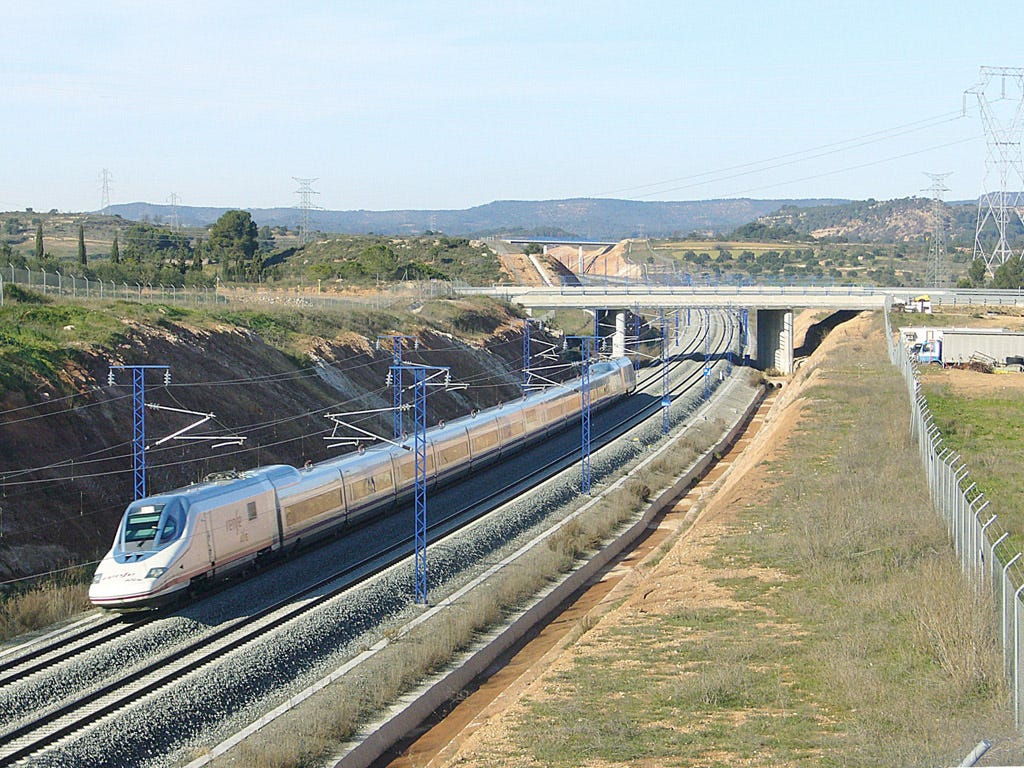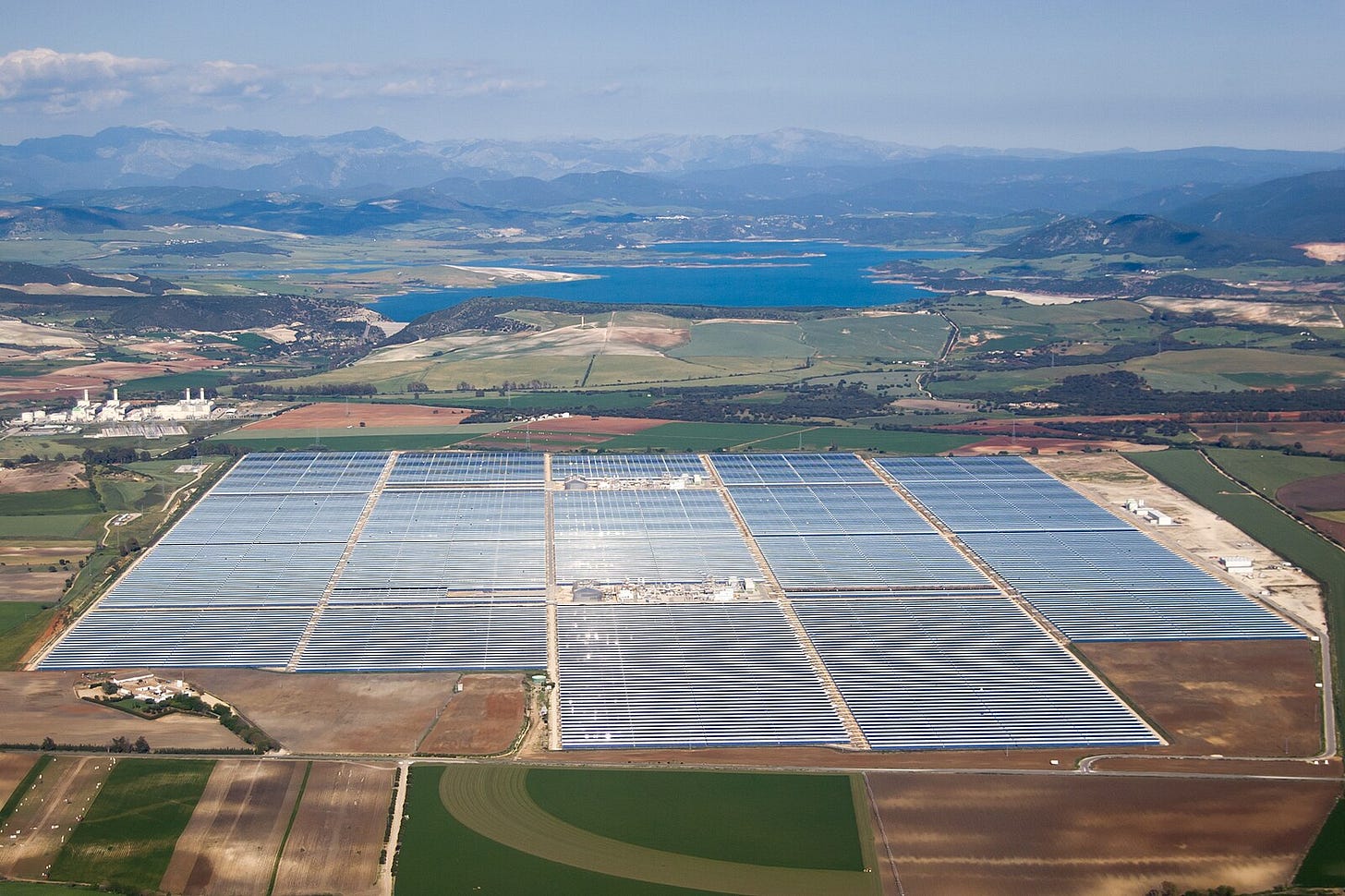What's Spain Actually Good At?
Beyond wine and olive oil, Spain has hidden strengths in industry, infrastructure, and health.
Hola,
As part of my job as an English teacher, I once asked a Spanish guy in his twenties what he thought Spain’s main export was. ‘Oranges,’ he replied. Lots of people might say the same thing, as Spain is indeed the world’s largest exporter of oranges. But the orange is not, and never has been, Spain’s biggest export. In 2022 citrus fruits made up only 0.93% of Spain’s total exports. This misconception highlights a broader issue: the lingering assumption among Spaniards and non-Spaniards alike that Spain’s economy runs on oranges and tourism. My student thought this even though he worked for a robotics company in Barcelona.
Spain is good at a lot more than just food and hospitality. Although Spain’s tourism industry is huge and still growing — much to the chagrin of residents in tourist spots — it's far from the only thing that sets Spain apart from the rest. Today I want to look at some lesser-known areas in which Spain excels.
The Automotive Industry
This was the correct answer to the question I asked my student. Cars are Spain’s biggest export. Spain is the second-largest car builder in Europe, building 2.45 million cars in 2023. Although SEAT is Spain’s only major homegrown car company, seven more brands build their cars in factories across Spain: Peugeot, Citroën, Opel, Volkswagen, Renault, Ford and Mercedes-Benz.
This started in the 60s, when Spain began to open up to the world towards the end of Franco’s rule and entered what was called the ‘Spanish miracle’, with industry growing at an annual rate of 21.7% for over a decade. Government incentives, skilled but relatively cheap workers and a good strategic location attracted Volkswagen and Ford to build plants. Sixty years later, Spain has huge pedigree in car production and some of the most efficient and automated plants in Europe. The automotive industry makes up 10% of Spain’s GDP, just below tourism’s 11.7%.
High Speed Rail
While the UK only has about 100km of truly high-speed rail and recently cancelled much of its plans to build more because of spiralling costs, Spain has been able, since 1992, to construct 3,996km of high-speed rail without massive cost overruns or delays. This means Spain has the second-longest high-speed network in the world after China; pushing high-tech Japan into third place. Looking at fares for tomorrow, the 504km journey from Madrid to Barcelona would take half as long (2.5 hours) and cost less than half as much (€69) as a journey of similar length from London to Glasgow. The success of these infrastructure projects which have a habit of turning into political and financial black holes in other countries has meant Spanish companies have been invited to help build similar high-speed networks in Saudi Arabia, Turkey and the USA.
AVE, the name of the publicly-owned high-speed service, stands for Alta Velocidad Española and is a play on the word ave, meaning bird. However, one of the few criticisms of the AVE is that it's impossible to go anywhere as the crow flies unless you’re going to Madrid. The high-speed railways and their branches stretch out from the capital like spokes on a wheel and are a symbol of Spain’s innate centralism. So if you want to go from Valencia to Barcelona directly you’re out of luck; you’ll have to use the older, slower service. A meme recently sarcastically celebrated the completion of a line to Murcia with a map showing how you could now get there from Málaga by high-speed rail - a journey of over seven hours with a connection in Madrid.
Organ Donation
Forget about being second-best in high-speed rail; for the last 32 years Spain has lead the world in organ donation and transplantation. Thanks to a well-designed national transplant system, a network of well-trained transplant coordinators in hospitals, intensive training programmes for personnel, and the high level of solidarity which exists in Spanish society, Spain is considered the gold standard here, and its system is studied and emulated by other countries. Spain accounts for 25% of deceased organ donors in the EU, despite only having 9% of its population, and performs 20% of all transplants in Europe. As a result, transplant waiting times have fallen in Spain over time, while elsewhere they have gone up.
Arms Sales
Spain giveth and Spain taketh away. Not everything is positive. The same country that has become so adept at saving lives at home through an amazing organ donation system also helps end them elsewhere through its arms exports. Spain was the 8th largest arms exporter worldwide between 2019 and 2023, selling aircraft, frigates, ammunition and military software, mainly to its NATO allies, but also to countries like Saudi Arabia. Although Spain recently stopped selling arms to Israel because of its actions in Gaza, with foreign minister José Manuel Albares saying ‘the Middle East does not need more weapons, it needs more peace’, Spain continues to export large quantities of military hardware to Saudi Arabia. Between 2010 and 2019, Spain sold defence material worth €3.7 billion to Saudi Arabia, some of which Saudi Arabia then used to pummel Yemen as part of their intervention in the Yemeni Civil War, resulting in thousands of deaths and widespread famine.
Renewable Energy
What better country to put solar panels on your house than in sunny Spain? However, when I moved to Spain in early 2018, the use of solar power was still held back by the ‘sun tax’ - an idea as counterintuitive as it sounds. Introduced in 2015, a 7% levy was charged on any energy generated by solar panels, supposedly to make sure individuals with solar installations paid their fair share towards maintaining the national grid. In reality, it penalised people for being self-sufficient and made solar energy generation totally inviable in Europe’s sunniest country.
Its repeal in 2018 put Spain back on the right track. Since then, solar power has grown to generate over 10% of Spain’s electricity, and in March 2024 renewables in general generated 65.2%. Spain annually competes with Germany for the number-one spot in the EU for wind and solar energy generation. It's becoming unusual now to see a house in the countryside without a few solar panels, and when I go out cycling it's not just orange groves I pass any more, it's also the occasional solar farm. In cities too, some of the underused flat roofs of apartment buildings are being decked out with solar panels for the benefit of the building’s occupants.
So Spain has far more going on in terms of industry and innovation than people give it credit for, and is perfectly placed to take advantage of the renewables revolution by using its infinite supply of sun and wind to help the industries of the future thrive. One challenge is making sure that opportunities are spread more evenly across the country; at the moment they’re concentrated mostly in Barcelona and Madrid, which creates huge regional inequalities. If the benefits of the automotive industry and high speed rail never reach somewhere like Badajoz, for example, then there’s little reason for someone living there to care that Spain exports anything other than olives and citrus fruits.
Thanks for reading,
Hasta la próxima!






